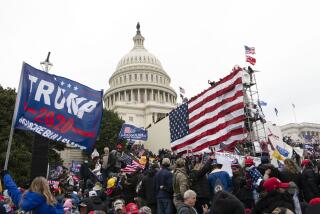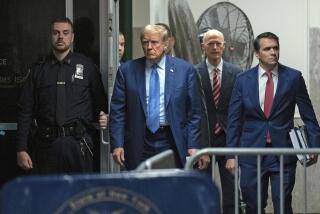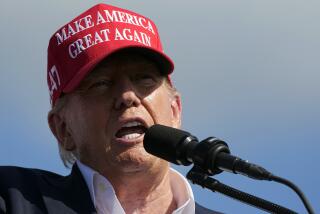Panels Immunity Use Sparks Controversy
- Share via
WASHINGTON — The joint House-Senate inquiry into the Iran- contra scandal, now nearing its last week of public hearings, so far has given limited immunity from criminal prosecution to 21 witnesses in exchange for their testimony, court records and other documents show.
Washington legal experts said they believe no congressional panel has wielded the controversial power so freely since 1973, when 27 witnesses received grants of immunity from the Senate Watergate Committee.
In both instances, Congress’ liberal use of the immunity power sparked battles with prosecutors considering criminal charges against some of the same persons the lawmakers sought to shield.
The Iran-contra panels this spring conducted a simmering argument with independent counsel Lawrence E. Walsh granting immunity to Oliver L. North, the former National Security Council aide, at the crux of the current scandal. North is a likely target of Walsh’s criminal investigation of the affair.
North, invoking his Fifth Amendment right against self-incrimination, refused to testify until Congress guaranteed him that Walsh could not use his testimony against him either as evidence or as leads. Walsh adamantly sought to delay the grant of immunity until his staff could gather conclusive evidence of either his wrongdoing or his innocence.
The tug-of-war delayed North’s testimony until midsummer, although the hearings began in May.
“That always happens,” said James Hamilton, former assistant chief counsel to the Watergate Committee and author of a landmark book on congressional investigations.
Watergate special prosecutor Archibald Cox, he said, “objected strongly” to the Senate’s plan to give immunity to John W. Dean III and Jeb Stuart Magruder, key figures in the scandal that led to the resignation of President Richard M. Nixon. “Indeed, he went to court to get Judge (John J.) Sirica to condition the immunity grants to their testimony being taken off television. And he lost.”
Congressional officials say that similar but less public disputes between Walsh and the panels have taken place over immunity grants to other key witnesses.
Among the 21 given immunity are Albert A. Hakim, the Iranian-American businessman who provided critical financial records on the sale of arms to Iran and the Nicaragua rebels; Fawn Hall and Robert Earle, two North aides who helped shred White House documents; Robert W. Owen, a consultant who passed money from North to rebel leaders, and North’s boss, former National Security Adviser John M. Poindexter.
The name of one person granted immunity remains sealed in U.S. District Court for reasons not officially explained. The witness may be an intelligence official whose identity normally would be secret.
Walsh has had reason to fight the grants because Congress’ power to give limited immunity from prosecution could easily wreck a criminal case against a wrongdoer. In past cases of congressional hearings, however, it does not appear to have worked out that way.
Walsh Grants Protection
Federal prosecutors can promise cooperating witnesses blanket immunity from prosecution. Walsh has granted such protection to Hall and Owen.
The congressional Iran-contra committees, by contrast, can grant only “use immunity.” That guarantees only that witnesses cannot be prosecuted on the basis of their sworn testimony or documentary evidence, such as Hakim’s financial records, that they provide the committees.
A congressional witness with a grant of limited immunity may still be jailed for crimes confessed on Capitol Hill, for the law allows prosecutors to keep and use any evidence gathered before a witness’ immunized testimony is made public. Thereafter, no new evidence brought out in that testimony or developed from it later may be used in a criminal case.
That hitch in the law places federal prosecutors such as Walsh in a race with congressional panels to develop rock-solid criminal cases against suspects before they have a chance to tell their stories to lawmakers. The law gives the prosecutors a head start, but only a small one.
A congressional panel must vote by a two-thirds majority to grant limited immunity to a witness. The notice then goes to a U.S. district court, which gives 10 days’ notice before testimony may be taken.
The independent counsel cannot prevent Congress from granting limited immunity, but he can seek up to 20 extra days of delay in the immunized testimony so that prosecutors may scramble to gather final bits of evidence.
“As a practical matter,” said one federal official, “it means a prosecutor has to segregate his evidence to show--if and when a defense counsel objects--that his evidence was derived from some source other than the testimony of the person who was granted immunity.”
In practice, congressional panels and prosecutors often delay testimony by more than 30 days in the interest of giving the prosecutor more time to make his case. That was true in the cases of North and Poindexter.
More to Read
Sign up for Essential California
The most important California stories and recommendations in your inbox every morning.
You may occasionally receive promotional content from the Los Angeles Times.










